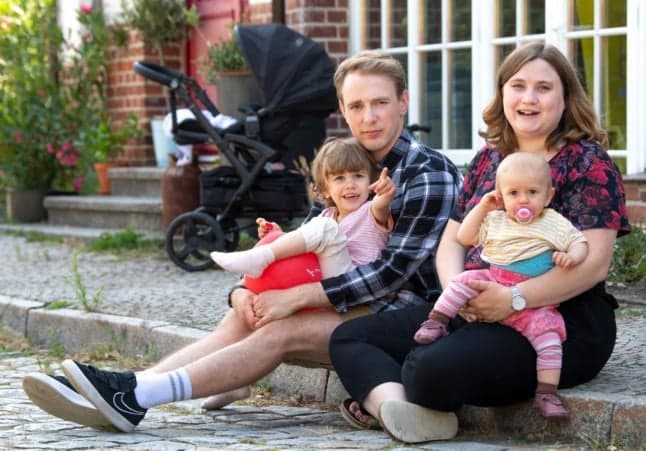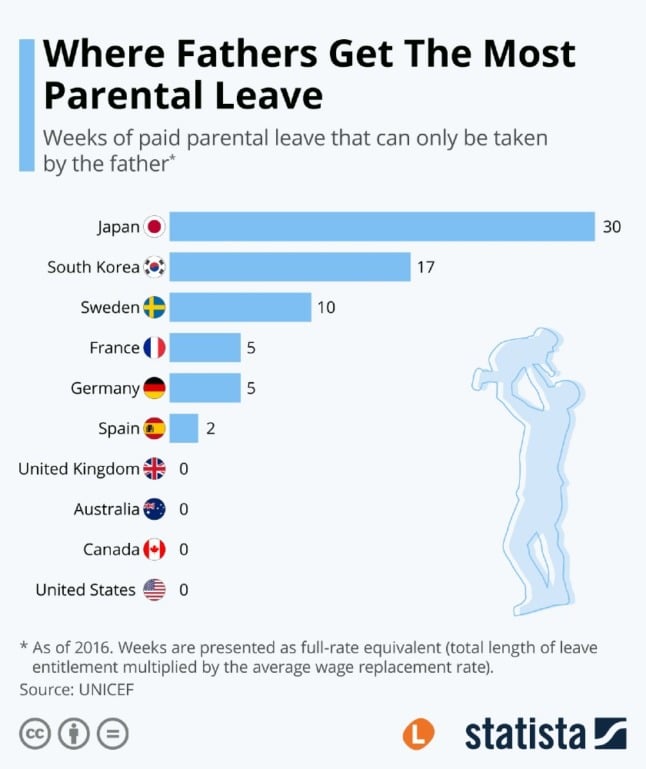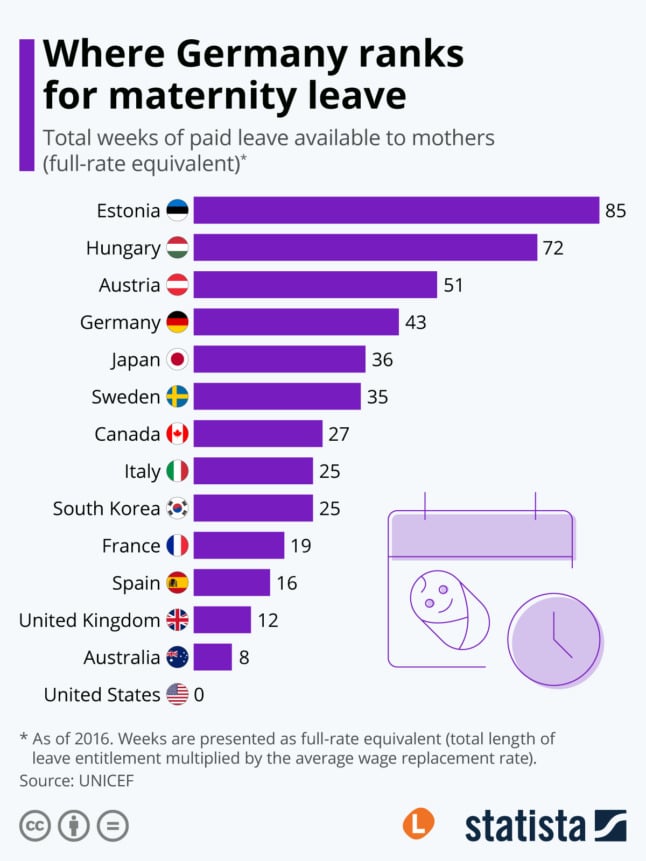EXPLAINED: Everything you need to know about parental leave in Germany

Both new mums and dads in Germany can take advantage of a generous parental leave policy. Here’s what you need to know, including the unique way leave can be split up, how it applies to freelancers, and where the Bundesrepublik stands in comparison to other countries.
All in all, job-protected parental leave can stretch up to three years in the Bundesrepublik. But how it’s carried out - including compensation received and if parents work part-time in that period - varies widely.
The Local spoke with Inga Sarrazin, co-founder of Berlin-based pregnancy and birth consulting service Maternita, to break down the basics of what you need to know.
Mandatory paid leave: Mutterschutz
The term “maternity leave” really applies to two things in Germany. First of all, there’s the paid time off work which expecting mums (or moms for our American readers) receive: Mutterschutz (mother protection time). For employees, this usually begins six weeks before the expected due date and stretches eight weeks after the birth.
While mothers-to-be can forfeit any or all of the time leading up to the birth - with clearance from their employers - they are legally obliged to take the two months after birth off work completely. They receive 100 percent of their salary during the total 3.5 month period (the time before birth and after). Freelancers with a sickness benefit in their insurance cover can also qualify for the payment scheme.
Prolonged parental leave: Elternzeit
Yet many mums take longer than these three and a half months. As with newbie fathers, they can apply for Elternzeit (parental leave) from their employers, and Elterngeld (parental allowance) from the government to help finance the time away from their jobs.
Through Elternzeit, new parents receive time fully or partially off work for a period of up to three years - with a special Kündigungsschutz (protection from being fired from their jobs). This protection kicks in as soon as a woman informs her employer that she’s pregnant.
“In Germany many mothers take a year of parental leave,” Sarrazin told The Local. “But there’s the entitlement to three years per child.”
That means that a woman who gives birth to twins could receive double that amount, or six years.
READ ALSO: What you need to know about Germany’s new parental benefits reform
Elternzeit can be taken off at any point before their child’s eighth birthday, and multiple times.
This leave must be applied for from the employer seven weeks before taking time off, meaning mothers who want to extend their leave after the Mutterschutz usually officially apply a week after their child is born.
If this seems daunting, they simply need to have the paperwork filled out ahead of time, and then ready to be signed and mailed in when their baby arrives.
For a full 12 of these months, they can apply for Elterngeld (parental allowance), which pays them a 65 percent replacement of their lost salary, but no more than €1,800 per month. Some employers will make up the difference in earnings.
Due to a new reform passed this year, parents on Elternzeit can work up to 32 hours, or four days a week, during all or part of the time.
READ ALSO: Here’s how Germany plans to reform Elterngeld for new parents
Are there any special conditions for paternity leave?
New fathers in Germany don’t receive any statutory leave, as mothers do with Mutterschutz, outside of the paid day they are entitled to for the birth of their own child.
All fathers, however, can apply for Elternzeit, also up to three years. Unlike with mothers, job protection for fathers only begins when they submit an application for Elternzeit.

Graph prepared for The Local by Statista.
Thanks to a special ‘Partner Bonus Months’ package, the amount of Elterngeld they can receive is extended from 12 to 14 months when both mothers and fathers take part in Elternzeit. Each parent can claim a minimum two months, and a maximum of 12 months, of the benefit.
They can either take this time separately or simultaneously. They can also divide up part-time work, for example if the mother works on Monday and Tuesdays and the father Wednesday through Fridays.
In 2020, 25 percent of Elternzeit applicants were fathers, up from 21 percent in 2015, according to Statista.
However, while mothers on average took 14.5 months of Elternzeit in 2020, the amount for fathers was only 3.7 months.
How does maternity leave work for freelancers?
As Elternzeit refers to going on full or partial leave from a job, it applies only to employees and not freelancers.
However, all self-employed people can apply for Elterngeld during the amount of time which they individually decide upon. They can also receive up to 65 percent of their income from the tax year before the birth.
"When a person is a freelancer, they can decide themselves how they set that up,” said Sarrazin.
”So if they work less, how long it lasts - but you don’t need to submit an extra application for the time off.”
Can you carry holiday time over?
Employers have the option - but not requirement - to reduce annual leave by 1/12 for every month of the parental leave, according to Sarrazin. That means that anyone who takes a year off could lose all of their holiday days.
Still the remaining vacation days, which an employee might have accumulated before the leave, are not affected.
How can parents decide how much time to take?
Deciding how long to take off is a very individual decision which boils down to a number of factors, ranging from personal preferences to Kita (day-care) availability.
But Sarrazin encourages new parents to take more rather than less time off - especially since extending the requested time is not always possible.
“There are parents that say after three months ‘I need to return to work, I need something else. And there are parents that would like to take care of their children for longer.'”
“It therefore makes sense to take a longer parental leave and see how it is. And you never know about finding a Kita spot. The majority are given away in August and then in December.”
All children in Germany are entitled to a free Kita spot from the age of one, which is why some parents decide to take a year off, and time their return to work with when their child can get into a Kita.
Yet Kitaplätze, especially in some bigger cities, can be notoriously hard to come by, leading parents to take longer off, or divide up part-time work between them in a longer period, to play it safe.
READ ALSO: Kitas: Why are parents suing for a childcare spot in Germany?
How does Germany compare to other countries?

Graph prepared for The Local by Statista.
Within the European Union (and, well, world), the country that offers the most maternity leave is the tiny Baltic nation of Estonia. There new mums can take up to 85 weeks of leave at full pay.
Sweden is often cited as the country with the most generous parental leave package for both mums and dads. New parents in the Nordic nation can take up to 480 days paid at 80 percent of their salaries. Each parent also has 90 days reserved exclusively for them - meaning it’s not uncommon to see fathers taking three or more months of leave.
Japan ranks as the country which offers the most paternity leave - six full months - yet only one in 20 fathers actually takes advantage of the policy.
At a full-rate pay equivalent, Switzerland, New Zealand, Australia and Ireland all ranked near the bottom of the OCED’s list of wealthy countries and maternity leave, each offering a little less than 10 weeks at a full-pay equivalent.
Yet they still come in well ahead of the US, the only developed country to offer no national paid leave policy. There, new parents are legally entitled to up to three months unpaid leave, but only if they work in a company with more than 50 employees.
Note: This guide is to serve as an overview, and not as legal or financial advice. More information can also be found in the latest English-language edition of the Federal Parental Allowance and Parental Leave Act, published by Germany’s Federal Ministry for Family Affairs.
Comments
See Also
All in all, job-protected parental leave can stretch up to three years in the Bundesrepublik. But how it’s carried out - including compensation received and if parents work part-time in that period - varies widely.
The Local spoke with Inga Sarrazin, co-founder of Berlin-based pregnancy and birth consulting service Maternita, to break down the basics of what you need to know.
Mandatory paid leave: Mutterschutz
The term “maternity leave” really applies to two things in Germany. First of all, there’s the paid time off work which expecting mums (or moms for our American readers) receive: Mutterschutz (mother protection time). For employees, this usually begins six weeks before the expected due date and stretches eight weeks after the birth.
While mothers-to-be can forfeit any or all of the time leading up to the birth - with clearance from their employers - they are legally obliged to take the two months after birth off work completely. They receive 100 percent of their salary during the total 3.5 month period (the time before birth and after). Freelancers with a sickness benefit in their insurance cover can also qualify for the payment scheme.
Prolonged parental leave: Elternzeit
Yet many mums take longer than these three and a half months. As with newbie fathers, they can apply for Elternzeit (parental leave) from their employers, and Elterngeld (parental allowance) from the government to help finance the time away from their jobs.
Through Elternzeit, new parents receive time fully or partially off work for a period of up to three years - with a special Kündigungsschutz (protection from being fired from their jobs). This protection kicks in as soon as a woman informs her employer that she’s pregnant.
“In Germany many mothers take a year of parental leave,” Sarrazin told The Local. “But there’s the entitlement to three years per child.”
That means that a woman who gives birth to twins could receive double that amount, or six years.
READ ALSO: What you need to know about Germany’s new parental benefits reform
Elternzeit can be taken off at any point before their child’s eighth birthday, and multiple times.
This leave must be applied for from the employer seven weeks before taking time off, meaning mothers who want to extend their leave after the Mutterschutz usually officially apply a week after their child is born.
If this seems daunting, they simply need to have the paperwork filled out ahead of time, and then ready to be signed and mailed in when their baby arrives.
For a full 12 of these months, they can apply for Elterngeld (parental allowance), which pays them a 65 percent replacement of their lost salary, but no more than €1,800 per month. Some employers will make up the difference in earnings.
Due to a new reform passed this year, parents on Elternzeit can work up to 32 hours, or four days a week, during all or part of the time.
READ ALSO: Here’s how Germany plans to reform Elterngeld for new parents
Are there any special conditions for paternity leave?
New fathers in Germany don’t receive any statutory leave, as mothers do with Mutterschutz, outside of the paid day they are entitled to for the birth of their own child.
All fathers, however, can apply for Elternzeit, also up to three years. Unlike with mothers, job protection for fathers only begins when they submit an application for Elternzeit.

Graph prepared for The Local by Statista.
Thanks to a special ‘Partner Bonus Months’ package, the amount of Elterngeld they can receive is extended from 12 to 14 months when both mothers and fathers take part in Elternzeit. Each parent can claim a minimum two months, and a maximum of 12 months, of the benefit.
They can either take this time separately or simultaneously. They can also divide up part-time work, for example if the mother works on Monday and Tuesdays and the father Wednesday through Fridays.
In 2020, 25 percent of Elternzeit applicants were fathers, up from 21 percent in 2015, according to Statista.
However, while mothers on average took 14.5 months of Elternzeit in 2020, the amount for fathers was only 3.7 months.
How does maternity leave work for freelancers?
As Elternzeit refers to going on full or partial leave from a job, it applies only to employees and not freelancers.
However, all self-employed people can apply for Elterngeld during the amount of time which they individually decide upon. They can also receive up to 65 percent of their income from the tax year before the birth.
"When a person is a freelancer, they can decide themselves how they set that up,” said Sarrazin.
”So if they work less, how long it lasts - but you don’t need to submit an extra application for the time off.”
Can you carry holiday time over?
Employers have the option - but not requirement - to reduce annual leave by 1/12 for every month of the parental leave, according to Sarrazin. That means that anyone who takes a year off could lose all of their holiday days.
Still the remaining vacation days, which an employee might have accumulated before the leave, are not affected.
How can parents decide how much time to take?
Deciding how long to take off is a very individual decision which boils down to a number of factors, ranging from personal preferences to Kita (day-care) availability.
But Sarrazin encourages new parents to take more rather than less time off - especially since extending the requested time is not always possible.
“There are parents that say after three months ‘I need to return to work, I need something else. And there are parents that would like to take care of their children for longer.'”
“It therefore makes sense to take a longer parental leave and see how it is. And you never know about finding a Kita spot. The majority are given away in August and then in December.”
All children in Germany are entitled to a free Kita spot from the age of one, which is why some parents decide to take a year off, and time their return to work with when their child can get into a Kita.
Yet Kitaplätze, especially in some bigger cities, can be notoriously hard to come by, leading parents to take longer off, or divide up part-time work between them in a longer period, to play it safe.
READ ALSO: Kitas: Why are parents suing for a childcare spot in Germany?
How does Germany compare to other countries?

Graph prepared for The Local by Statista.
Within the European Union (and, well, world), the country that offers the most maternity leave is the tiny Baltic nation of Estonia. There new mums can take up to 85 weeks of leave at full pay.
Sweden is often cited as the country with the most generous parental leave package for both mums and dads. New parents in the Nordic nation can take up to 480 days paid at 80 percent of their salaries. Each parent also has 90 days reserved exclusively for them - meaning it’s not uncommon to see fathers taking three or more months of leave.
Japan ranks as the country which offers the most paternity leave - six full months - yet only one in 20 fathers actually takes advantage of the policy.
At a full-rate pay equivalent, Switzerland, New Zealand, Australia and Ireland all ranked near the bottom of the OCED’s list of wealthy countries and maternity leave, each offering a little less than 10 weeks at a full-pay equivalent.
Yet they still come in well ahead of the US, the only developed country to offer no national paid leave policy. There, new parents are legally entitled to up to three months unpaid leave, but only if they work in a company with more than 50 employees.
Note: This guide is to serve as an overview, and not as legal or financial advice. More information can also be found in the latest English-language edition of the Federal Parental Allowance and Parental Leave Act, published by Germany’s Federal Ministry for Family Affairs.
Join the conversation in our comments section below. Share your own views and experience and if you have a question or suggestion for our journalists then email us at [email protected].
Please keep comments civil, constructive and on topic – and make sure to read our terms of use before getting involved.
Please log in here to leave a comment.